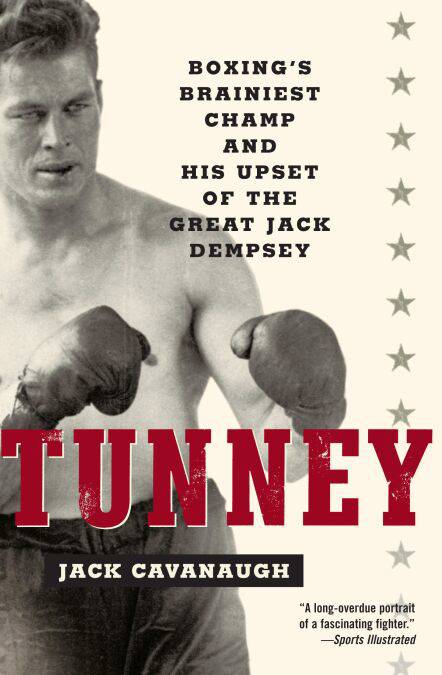
- Afhalen na 1 uur in een winkel met voorraad
- Gratis thuislevering in België vanaf € 30
- Ruim aanbod met 7 miljoen producten
- Afhalen na 1 uur in een winkel met voorraad
- Gratis thuislevering in België vanaf € 30
- Ruim aanbod met 7 miljoen producten
Zoeken
Tunney E-BOOK
Boxing's Brainiest Champ and His Upset of the Great Jack Dempsey
Jack Cavanaugh
E-book | Engels
€ 5,75
+ 5 punten
Omschrijving
Among the legendary athletes of the 1920s, the unquestioned halcyon days of sports, stands Gene Tunney, the boxer who upset Jack Dempsey in spectacular fashion, notched a 77—1 record as a prizefighter, and later avenged his sole setback (to a fearless and highly unorthodox fighter named Harry Greb). Yet within a few years of retiring from the ring, Tunney willingly receded into the background, renouncing the image of jock celebrity that became the stock in trade of so many of his contemporaries. To this day, Gene Tunney’s name is most often recognized only in conjunction with his epic “long count” second bout with Dempsey.
In Tunney, the veteran journalist and author Jack Cavanaugh gives an account of the incomparable sporting milieu of the Roaring Twenties, centered around Gene Tunney and Jack Dempsey, the gladiators whose two titanic clashes transfixed a nation. Cavanaugh traces Tunney’s life and career, taking us from the mean streets of Tunney’s native Greenwich Village to the Greenwich, Connecticut, home of his only love, the heiress Polly Lauder; from Parris Island to Yale University; from Tunney learning fisticuffs as a skinny kid at the knee of his longshoreman father to his reign atop boxing’s glamorous heavyweight division.
Gene Tunney defied easy categorization, as a fighter and as a person. He was a sex symbol, a master of defensive boxing strategy, and the possessor of a powerful, and occasionally showy, intellect–qualities that prompted the great sportswriters of the golden age of sports to portray Tunney as “aloof.” This intelligence would later serve him well in the corporate world, as CEO of several major companies and as a patron of the arts. And while the public craved reports of bad blood between Tunney and Dempsey, the pair were, in reality, respectful ring adversaries who in retirement grew to share a sincere lifelong friendship–with Dempsey even stumping for Tunney’s son, John, during the younger Tunney’s successful run for Congress.
Tunney offers a unique perspective on sports, celebrity, and popular culture in the 1920s. But more than an exciting and insightful real-life tale, replete with heads of state, irrepressible showmen, mobsters, Hollywood luminaries, and the cream of New York society, Tunney is an irresistible story of an American underdog who forever changed the way fans look at their heroes.
In Tunney, the veteran journalist and author Jack Cavanaugh gives an account of the incomparable sporting milieu of the Roaring Twenties, centered around Gene Tunney and Jack Dempsey, the gladiators whose two titanic clashes transfixed a nation. Cavanaugh traces Tunney’s life and career, taking us from the mean streets of Tunney’s native Greenwich Village to the Greenwich, Connecticut, home of his only love, the heiress Polly Lauder; from Parris Island to Yale University; from Tunney learning fisticuffs as a skinny kid at the knee of his longshoreman father to his reign atop boxing’s glamorous heavyweight division.
Gene Tunney defied easy categorization, as a fighter and as a person. He was a sex symbol, a master of defensive boxing strategy, and the possessor of a powerful, and occasionally showy, intellect–qualities that prompted the great sportswriters of the golden age of sports to portray Tunney as “aloof.” This intelligence would later serve him well in the corporate world, as CEO of several major companies and as a patron of the arts. And while the public craved reports of bad blood between Tunney and Dempsey, the pair were, in reality, respectful ring adversaries who in retirement grew to share a sincere lifelong friendship–with Dempsey even stumping for Tunney’s son, John, during the younger Tunney’s successful run for Congress.
Tunney offers a unique perspective on sports, celebrity, and popular culture in the 1920s. But more than an exciting and insightful real-life tale, replete with heads of state, irrepressible showmen, mobsters, Hollywood luminaries, and the cream of New York society, Tunney is an irresistible story of an American underdog who forever changed the way fans look at their heroes.
Specificaties
Betrokkenen
- Auteur(s):
- Uitgeverij:
Inhoud
- Aantal bladzijden:
- 496
- Taal:
- Engels
Eigenschappen
- Productcode (EAN):
- 9780307492166
- Verschijningsdatum:
- 1/04/2009
- Uitvoering:
- E-book
- Beveiligd met:
- Adobe DRM
- Formaat:
- ePub

Alleen bij Standaard Boekhandel
+ 5 punten op je klantenkaart van Standaard Boekhandel
Beoordelingen
We publiceren alleen reviews die voldoen aan de voorwaarden voor reviews. Bekijk onze voorwaarden voor reviews.








